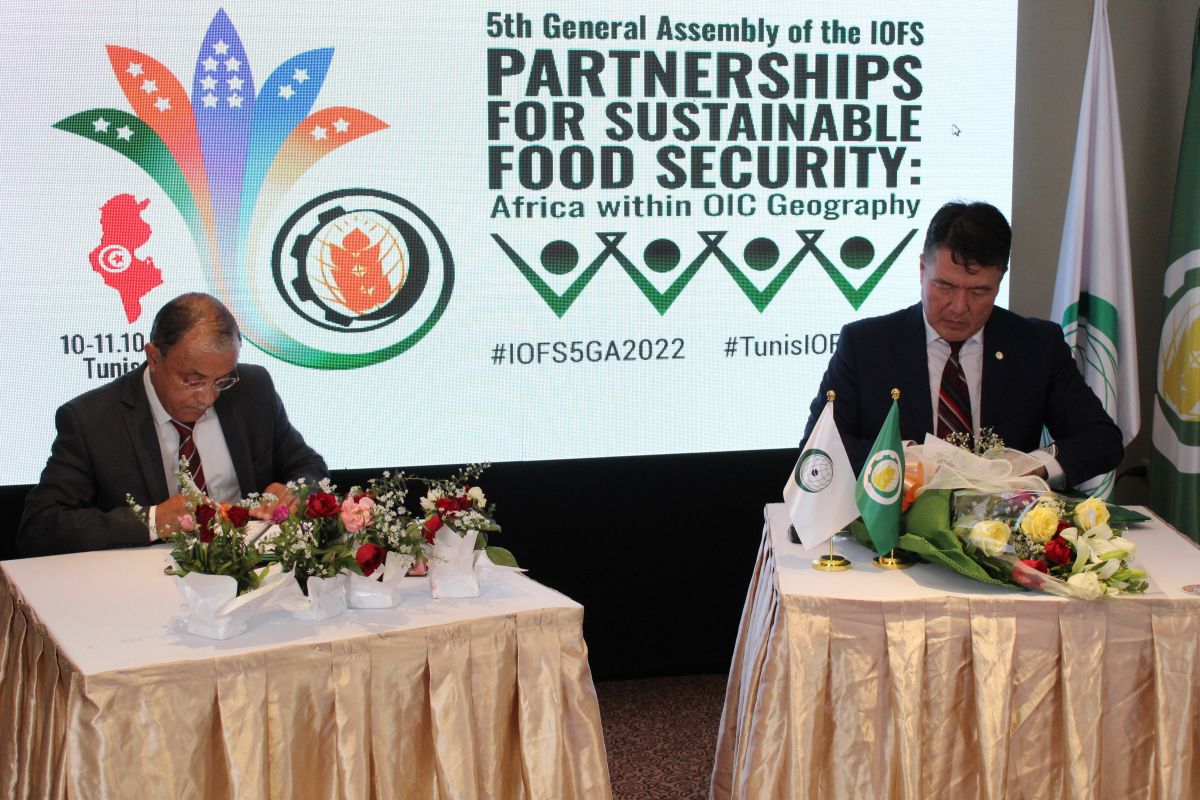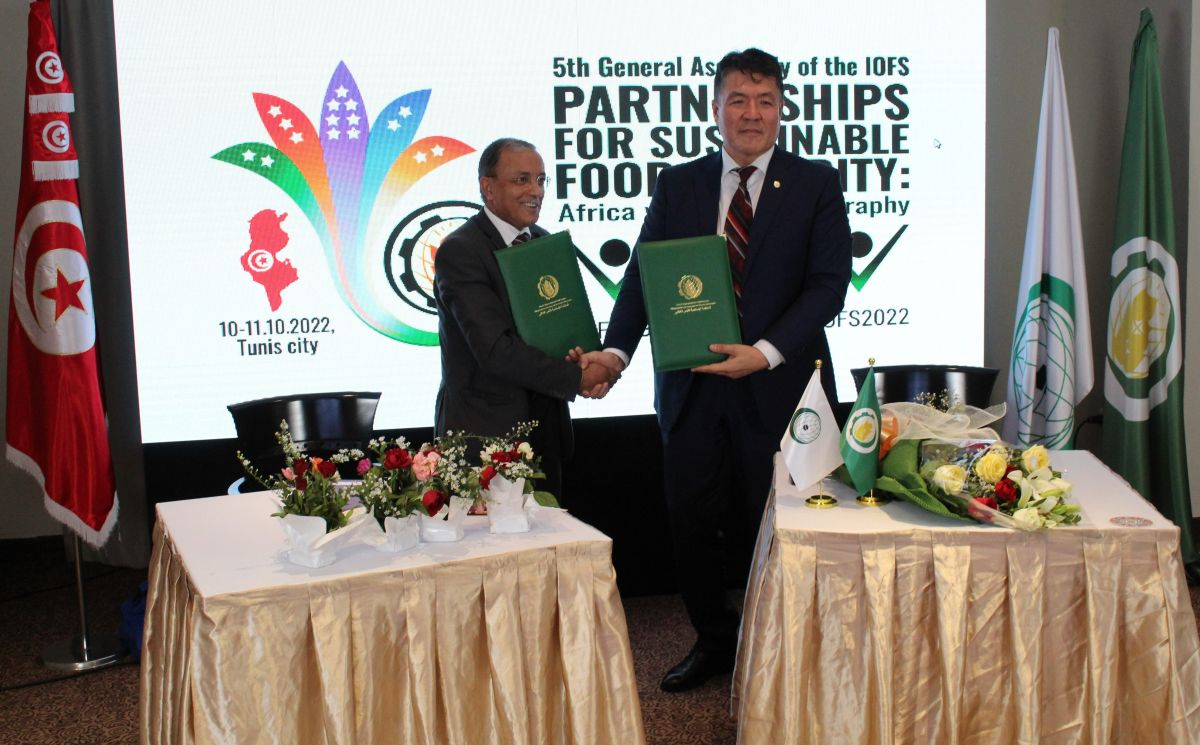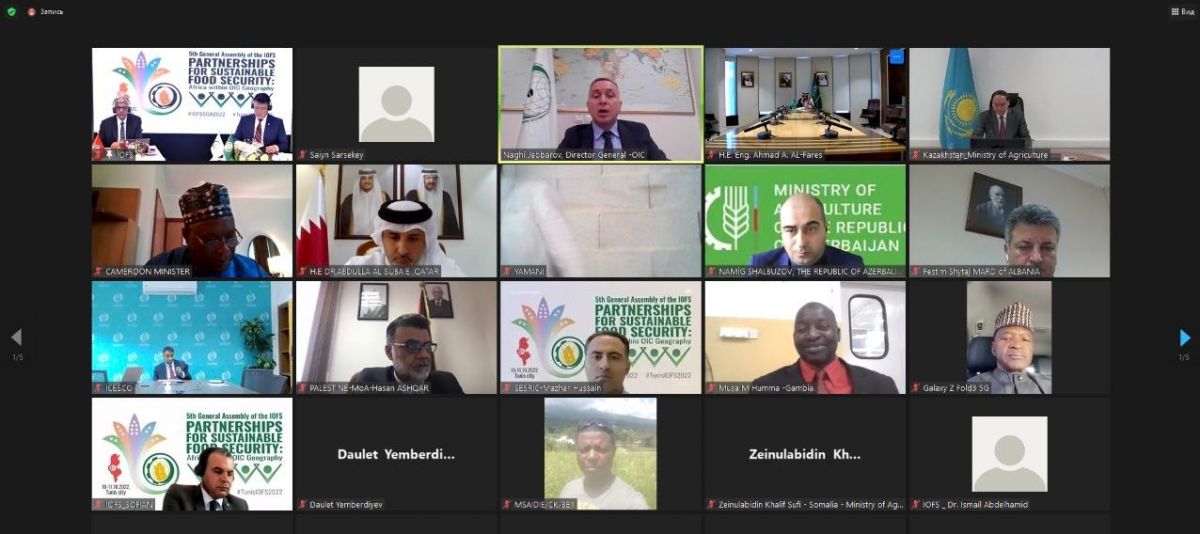The Ministerial Session of the 5th General Assembly of the Islamic Organization for Food Security was held on 11 October 2022 in Tunis, Republic of Tunisia.
In his capacity as outgoing Chair, H.E Mr. Yerbol Karashukeyev, Minister of Agriculture of the Republic of Kazakhstan, opened the proceedings by announcing the quorum, noting that the event brought together 33 out of 37 IOFS Member States and gathered 41 official representatives from OIC Member States and Observers. His last act as Chairman of the 4th General Assembly was the Chairmanship transfer to the Republic of Tunisia, Minister of Agriculture, Water Resources and Fisheries, H.E Mr. Mahmoud Elies Hamza, who was represented by Director General of Studies and Agricultural Development, Republic of Tunisia, H.E. Mr. Abdelhalim Guesmi.
Continuing the proceedings, the IOFS Director General, H.E. Mr. Yerlan Baidaulet, made an informative presentation devoted to the overall outcomes of Kazakhstan’s chairmanship, particularly the achievements in terms of implementation of IOFS’ 16 strategic programs. He then signed a series of bilateral Memoranda of Understanding on exploring spheres of mutual interests and strengthening cooperation with different partners, including the Arab Centre for the Studies of Arid Zones and Drylands (ACSAD), the National Institute of Agricultural Research of Tunisia (INRAT), Chamber of Commerce and Industry of Guinea, and Tunisian Union of Industry, Trade and Handicrafts (UTICA).

After statements by participating Ministers, the Resolutions of the 5th General Assembly were adopted. The main outcomes therein included the decision to celebrate OIC Food Security Day every 11th of December, the opening of IOFS Regional Offices, the mandate to closely work with civil society, the transformation and growth of the International Islamic Food Processing Association (IFPA), the prospect of cooperation on conservation and use of plant and animal genetic resources, which was integrated with the “Almaty Forum Declaration.”
Additionally, the Ministerial Session welcomed the Republic of Tajikistan as a full-fledged IOFS Member State and expressed gratitude to the Republic of Chad for signing the IOFS Statute, increasing the number of Member states to 37. During the session, the Republic of Azerbaijan stated that all domestic measures were being taken for the country to be a full-fledged IOFS Member States without delay.
Finally, it is important to note that the 5th General Assembly was instrumental in electing new Members of the Executive Board, which now includes: the State of Qatar (as Chair), the UAE, the Republic of Tajikistan, the Islamic Republic of Pakistan, the Republic of Cameroon, Republic of The Gambia, Republic of Kazakhstan (permanent member), and the Director-General of IOFS (Non-Voting Member). The Kingdom of Saudi Arabia was welcomed as Honorary Chair of the Executive Board for its unwavering support towards the institutionalization of the IOFS.
On the sidelines of the Assembly, the IOFS Director General also participated in the 14th edition of the International Agricultural Investment and Technology Fair (SIAT), which was held in the Kram Exhibition Center of Tunis. The Fair organized by the Agricultural Investment Promotion Agency (APIA) named “Intelligent investment for sustainable development” was devoted to the development of smart agriculture. The event brought together participants of 15 countries, including leading experts and representatives of international organizations from Egypt, France, the United States of America, India, Indonesia, Russia and Congo.
IOFS Director General, during the keynote address at the official opening ceremony, welcomed participants of the SIAT Forum 2022 and briefed the audience on IOFS activities aimed at increasing domestic food productivity, through utilization of appropriate technology and the scaling up of funding mechanisms and investments.



![البحوث الزراعية والمنظمة الإسلامية للأمن الغذائي ينظمان ورشة عن إنتاج أصناف الأرز الأكثر إنتاجية [ожидает перевода]](/ar/assets/components/phpthumbof/cache/screenshot-2024-10-07-13-52-09-27-jpg-720x442.a9c354a28cbc41a4bfff44fed1e082a7.webp)


